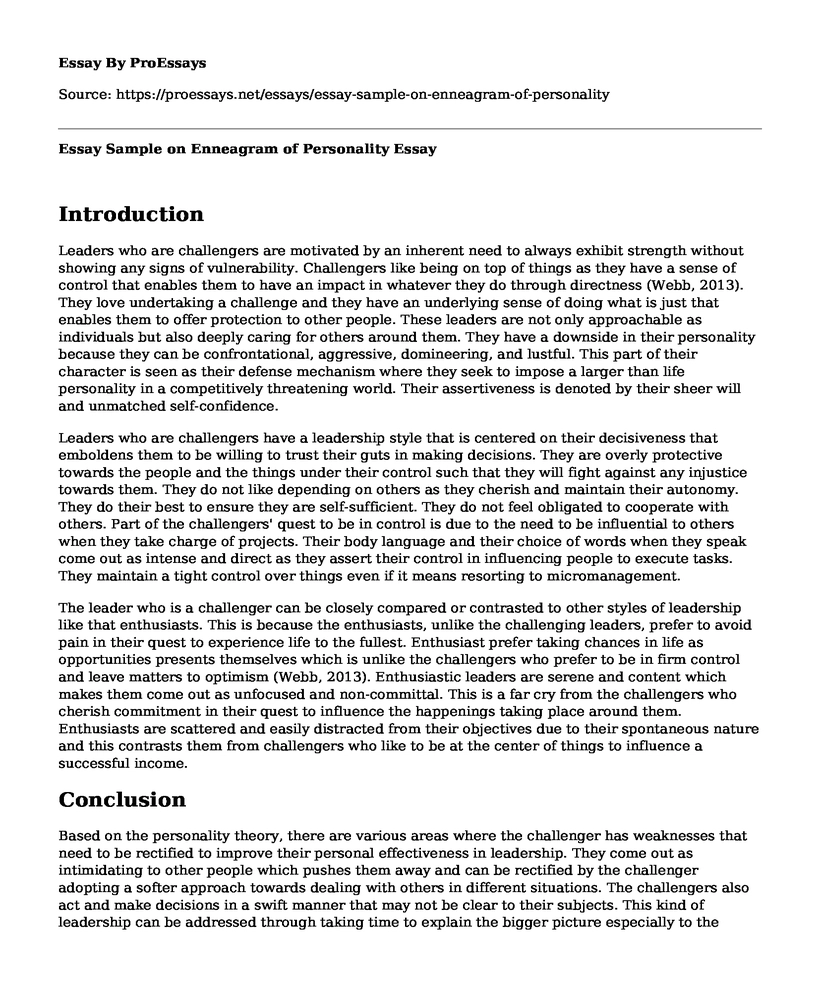Introduction
Leaders who are challengers are motivated by an inherent need to always exhibit strength without showing any signs of vulnerability. Challengers like being on top of things as they have a sense of control that enables them to have an impact in whatever they do through directness (Webb, 2013). They love undertaking a challenge and they have an underlying sense of doing what is just that enables them to offer protection to other people. These leaders are not only approachable as individuals but also deeply caring for others around them. They have a downside in their personality because they can be confrontational, aggressive, domineering, and lustful. This part of their character is seen as their defense mechanism where they seek to impose a larger than life personality in a competitively threatening world. Their assertiveness is denoted by their sheer will and unmatched self-confidence.
Leaders who are challengers have a leadership style that is centered on their decisiveness that emboldens them to be willing to trust their guts in making decisions. They are overly protective towards the people and the things under their control such that they will fight against any injustice towards them. They do not like depending on others as they cherish and maintain their autonomy. They do their best to ensure they are self-sufficient. They do not feel obligated to cooperate with others. Part of the challengers' quest to be in control is due to the need to be influential to others when they take charge of projects. Their body language and their choice of words when they speak come out as intense and direct as they assert their control in influencing people to execute tasks. They maintain a tight control over things even if it means resorting to micromanagement.
The leader who is a challenger can be closely compared or contrasted to other styles of leadership like that enthusiasts. This is because the enthusiasts, unlike the challenging leaders, prefer to avoid pain in their quest to experience life to the fullest. Enthusiast prefer taking chances in life as opportunities presents themselves which is unlike the challengers who prefer to be in firm control and leave matters to optimism (Webb, 2013). Enthusiastic leaders are serene and content which makes them come out as unfocused and non-committal. This is a far cry from the challengers who cherish commitment in their quest to influence the happenings taking place around them. Enthusiasts are scattered and easily distracted from their objectives due to their spontaneous nature and this contrasts them from challengers who like to be at the center of things to influence a successful income.
Conclusion
Based on the personality theory, there are various areas where the challenger has weaknesses that need to be rectified to improve their personal effectiveness in leadership. They come out as intimidating to other people which pushes them away and can be rectified by the challenger adopting a softer approach towards dealing with others in different situations. The challengers also act and make decisions in a swift manner that may not be clear to their subjects. This kind of leadership can be addressed through taking time to explain the bigger picture especially to the people who are supposed to implement the action plans. A challenger as a leader has the problem of perceiving others as weak which may come out as dismissive and increase the likelihood of ignoring good advice or ideas from their subordinates.
Reference
Webb, K. (2013). Principles of the Enneagram. London: Singing Dragon.
Cite this page
Essay Sample on Enneagram of Personality. (2022, Aug 15). Retrieved from https://proessays.net/essays/essay-sample-on-enneagram-of-personality
If you are the original author of this essay and no longer wish to have it published on the ProEssays website, please click below to request its removal:
- One Thing I'm Afraid to Lose Essay
- Paper Example on Delirium, Dementia, and Depression
- Stressful Life Events Case Study Paper Example
- How My Mother's Behavior Inspired Me - Essay Sample
- Essay on PMHNP: Diagnostic Assessment & Treatment for Psychiatric Disorders
- Paper Sample on Personal Growth and Development: Achieving a Satisfying Life
- Essay on Benjamin Netanyahu's Leadership in the Israeli Parliamentary System: Overcoming Perils of Presidentialism







